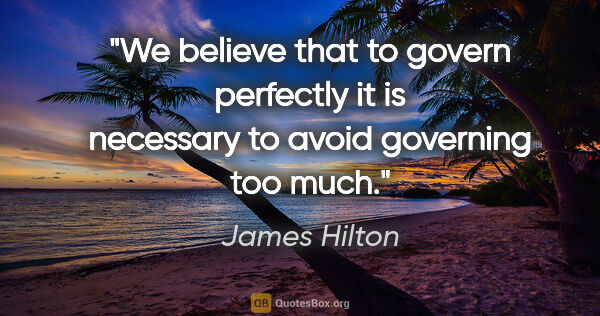Governance Quotes (page 16)
Certainly one of the chief guarantees of freedom under any government, no matter how popular and respected, is the right of the citizens to keep and bear arms. [...] the right of the citizens to bear arms is just one guarantee against arbitrary government and one more safeguard against a tyranny which now appears remote in America, but which historically has proved to be always possible.
Hubert H. Humphrey
There are only four ways in which a ruling group can fall from power. Either it is conquered from without, or it governs so inefficiently that the masses are stirred to revolt, or it allows a strong and discontented Middle Group to come into being, or it loses its own self-confidence and willingness to govern. These causes do not operate singly, and as a rule all four of them are present in some degree. A ruling class which could guard against all of them would remain in power permanently....
George Orwell
It is the principal paradox of this period that the only sphere of our economic system in which government intervention is urgently necessary is also the only point at which action of the State is now effectively inhibited. It is in the region of wages and prices that we really require the continual economic leadership of government, but in our prevailing trade structure any such suggestion has come to be regarded as impious.
Oswald Mosley
The only foundation for a useful education in a republic is to be laid in religion. Without this there can be no virtue, and without virtue there can be no liberty; and liberty is the object and life of all republican governments....We waste so much time and money in punishing crimes, and take so little pains to prevent them. We profess to be republicans, and yet we neglect the only means of establishing and perpetuating our republican forms of government, that is, the universal education of...
Benjamin Rush

In all times and in all places, whatever may be the name that the government takes, whatever has been its origin, or its organization, its essential function is always that of oppressing and exploiting the masses, and of defending the oppressors and exploiters. Its principal characteristic and indispensable instruments are the bailiff and the tax collector, the soldier and the prison. And to these are necessarily added the time-serving priest or teacher, as the case may be, supported and...
Errico Malatesta
I consider the central idea pervading this struggle is the necessity that is upon us, of proving that popular govenment is not an absurdity. We must settle this question now, whether in a free government the minority have the right to break up the govenment whenever they choose. If we fail it will go far to prove the incapability of the people to govern themselves.
Abraham Lincoln
There is still a tendency to regard any existing government intervention as desirable, to attribute all evils to the market, and to evaluate new proposals for government control in their ideal form, as they might work if run by able, disinterested men free from the pressure of special interest groups.
Milton Friedman
If any man at this day sincerely believes that a proper division of local from federal authority, or any part of the Constitution, forbids the Federal Government to control as to slavery in the federal territories, he is right to say so, and to enforce his position by all truthful evidence and fair argument which he can. But he has no right to mislead others, who have less access to history, and less leisure to study it, into the false belief that "our fathers who framed the Government under...
Abraham Lincoln
The Form of Government, which you admire, when its Principles are pure is admirable, indeed, it is productive of every Thing, which is great and excellent among Men. But its Principles are as easily destroyed, as human Nature is corrupted. Such a Government is only to be supported by pure Religion or Austere Morals. Public Virtue cannot exist in a Nation without private virtue....Without religion this world would be something not fit to be mentioned in polite company:...I mean Hell.
John Adams
